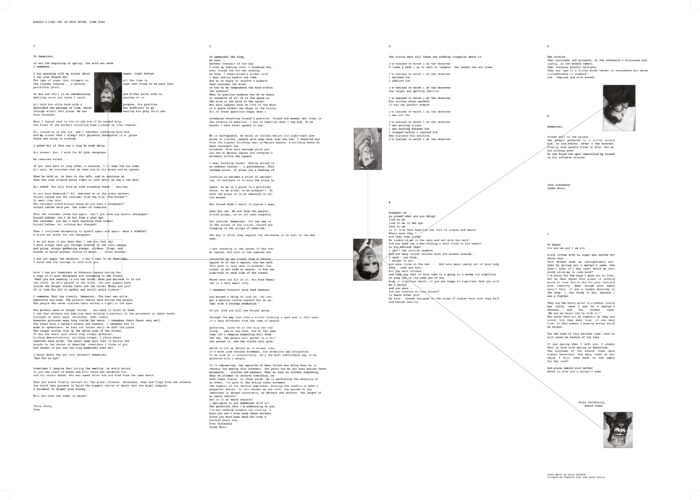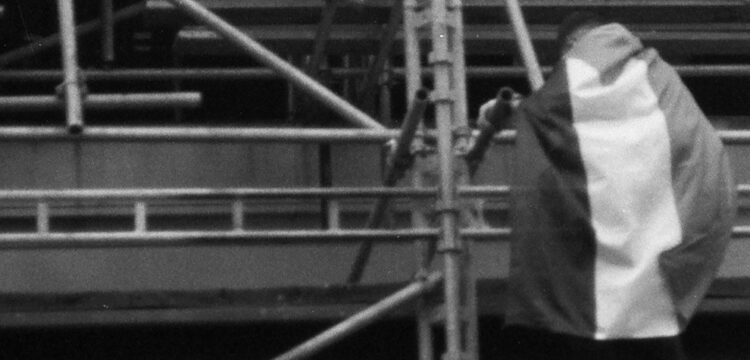No Moves To Innocence
A statement by Lateral Roma to address concerns among cultural workers and artists
A group of individuals who are members, associates, and former collaborators of Lateral Roma expresses their support for the Palestinian struggle for liberation through a collective statement titled “NO MOVES TO INNOCENCE.” The statement, which was created under the open network of Lateral Roma, outlines a set of demands, provides recommendations for solidarity, and issues a specific call to action aimed at the broader arts and culture community. Along with the statement, there is a comprehensive index that highlights the implications of solidarity with those who are oppressed by imperialist, colonial, and patriarchal violence. The statement is credited to the signatories listed below.
The image published along with this statement is a poster by artist Dina Mimi titled, “Nobody’s died yet in this house” which was on display during the two-day event, Racconto Grosso, at Lateral Roma in 2022. Mimi’s poster will also be made available for purchase as part of a fundraiser hosted by Lateral Roma, all funds raised will be donated to the European Legal Support Center ELSC that defends and empowers advocates for Palestinian rights across mainland Europe and the United Kingdom through legal means – for more information see elsc.support.
Lateral Roma, an independent and cooperative art and project space in Rome, collaborates with an international community consisting of artists, curators, writers, poets, researchers, and other cultural professionals. For more information see @lateralroma on Instagram or contact us at [email protected].
The Italian translation of this statement is available as a PDF here.
We, the undersigned, operating under the framework of Lateral Roma [1], explicitly emphasize the need for all cultural workers, artists, and art and cultural institutions to acknowledge their responsibility during moments of crisis. Today, this involves actively avoiding silence and erasure that undermines the voices of Palestinian colleagues and people’s struggle. We call upon individuals, organizations, and institutions to take a stand against exploitative cultural perpetuations of appropriating, tokenizing, deflecting from necessary criticism, and artwashing which leads to further conduct that undermines the voices of Palestinian colleagues and people’s struggle.
In solidarity with the Palestinian people, we demand the following:
- Immediate ceasefire!
- Let humanitarian aid into Gaza.
- Safely release all political prisoners and hostages.
- Stop the genocide by Israel and its allies.
- End apartheid and occupation of Palestine.
- Right to self-determination for the Palestinian people.
- Return properties from illegal settlements to Palestinians.
- Start a process of reparations for Palestinians.
- Stand up against the fascist EU/US suppression of Palestinian solidarity movements.
- Intercept journalistic propaganda and malpractice.
- Adhere, support, and unban BDS/cultural boycott calls by Palestinians.
- Break the silence and speak out against this EU/US-backed war by pressuring politicians, writing statements, and directing actions such as strikes, protests, boycotts, resignations, and withdrawals.
Our language is intentional and explicit as a decolonial practice, process, and tool. We voice our demands in solidarity with all those who are oppressed by imperialist, colonial, and patriarchal violence.
We stand committed to undertaking the historical processes [2], by acknowledging: the settler colonial origins [3] of the state of Israel as a Zionist project and the subsequent forced displacement of Palestinians from their land; the extent of active involvement of Western powers in the Israeli occupation and apartheid; the importance of employing an accurate terminology [4] while speaking of the violations of international law and war crimes, especially with regards to Israel’s ongoing occupation of Palestine backed by the EU and US.
This last commitment involves precision in our use of terms such as ethnic cleansing [5], genocide [6], occupation [7], and apartheid [8] to describe the ongoing and recent developments of Palestinian living conditions; also, acknowledging the weaponization of labels like anti-Semitism by the Zionist project [9] and the grief and pain that it creates [10]. As cultural workers and artists, our work lies in the refusal of language and rhetoric, which obscures the true enormity of the struggles faced by the Palestinian people and dehumanizes them.
The genocide in Palestine is a paramount moment for all forms of resistance and revolutionary movements. This is also a critical point to show solidarity with resistance movements on a global scale including feminist movements, Black Lives Matter, abolitionist prison movements, queer rights, labor rights, anti-racism, anti-Islamophobia, no tolerance for anti-Semitism, indigenous sovereignty movements, and navigating against the fascist pulls on our shared political climate [11]. We stand against the police and military state [12], surveillance and apartheid state [13], imperial-colonial expansion [14], subjugation [15], genocide [16], and their entanglements with industrial complexes [17]. We encourage all cultural workers and artists to witness this as a historical moment and take a loud stand against these injustices, in solidarity with Palestinian liberation.
Through our solidarity, we also want to invariably remember and oppose all colonial occupations. We stand with those fighting for survival in their homelands, dream of sovereignty and legitimacy, and call for their agency to define constitutional rights within the specificity of their self-determination, context, and circumstance –– a free Palestine, from the river to the sea [18].
Our cultural work is obliged by this responsibility and the ongoing effort for the liberation of all people from colonial oppression. In Germany, Italy, Switzerland, and elsewhere, we are outraged at specific and developing examples [19], many of which illustrate how political bias [20] has impacted our right to show solidarity, protest, and the cultural work that we partake in with Palestinian artists and cultural workers [21].
Our work is greatly influenced by solidarity movements in line with the liberation of the Palestinian people, we call on cultural workers, artist initiatives, individuals, and cultural institutions to:
- Denounce cultural space that chooses silence while being funded by families benefiting from the industrial war complex.
- Emphasize the contention between material interests (i.e. profits) and human rights, delineating the humanitarian cause at stake and who stands to profit.
- Be vigilant and actively resist any systemic interference that hinders efforts to express or support solidarity in cultural spaces and publications.
- Exercise our Freedom of Expression that is protected by Article 19 of the United Nations Universal Declaration of Human Rights.
- Align your actions with and inform yourself of the existing opposition activities such as the Palestinian International Call for Boycott, Divestment, and Sanctions (BDS/PACBI), the Apartheid Free Zone movement, local diaspora groups that organize activities, and trade union solidarity organizations.
- Use your spaces, resources, and networks to inform, foster critical thinking, and uplift Palestinian voices in their struggle for liberation and self-determination.
- Encourage collective imaginations that bring about and reflect upon better political-social realities and solutions for safety and freedom for everyone, and without exception.
- Recognize the collective work necessary to make sure justice, equality, and dignity are accorded to every person.
- No moves to innocence. Sit with discomfort and center the marginalized individual and collective voices of those who have historically been socialized to not take up and/or receive support from governmental, institutional, and cultural positions and/or spaces—especially when they articulate their experiences that are different and unjust.
Note: The title of this letter is inspired by the work of E. Tuck and K.W. Yang, Decolonization is not a metaphor, published in ‘Decolonization: Indigeneity, Education & Society’, 2012.

REFERENCES
[1] Lateral Roma is an independent art and project space in Rome run by and in dialogue with an international community including artists, curators, writers, poets, researchers, and other cultural professionals.
[2] B’Tselem & Forensic Architecture. Conquer and Divide. 2018. www.conquer-and-divide.b’tselem.org.
[3] Working Class History. Balfour declaration. Working Class History, 2023. www.stories.workingclasshistory.com/article/11643/balfour-declaration.
[4] Words about War. A Language Guide for Discussing War and Foreign Policy – Language use about Gaza: Ten urgent suggestions. Words about War, 2023. www.wordsaboutwar.org.
Also: Stephen Bennett. On the dehumanization of the Palestinians. Institute for Palestine Studies, 2023. www.palestine-studies.org/en/node/1654481.
[5] “ethnic cleansing”. Encyclopedia Britannica, 2023. www.britannica.com/topic/ethnic-cleansing.
[6] Raz Segal. A textbook case of genocide. Jewish Currents, 2023. www.jewishcurrents.org/a-textbook-case-of-genocide.
[7] Sut Jhally, Loretta Alper, Jeremy Earp. The Occupation of the American Mind. Support for the free distribution of this film was provided by the Wallace Action Fund of Tides Foundation. Media Education Foundation, 2023. www.occupationmovie.org.
[8] Israel’s apartheid against Palestinians. Amnesty International, 2023. www.amnesty.org/en/latest/campaigns/2022/02/israels-system-of-apartheid.
[9] Multiple: Palestinian rights and the IHRA definition of antisemitism in The Guardian (Letters); Human rights organizations based in Israel voice concern before Bundestag president over motion defining BDS as antisemitism by B’Tselem; Netanyahu: An ICC investigation of Israel would be ‘pure anti-Semitism’ in Times of Israel; Principles for Dismantling Antisemitism: A Progressive Jewish Response to the Jerusalem Declaration by Jewish Voice for Peace.
[10] Gabriel Winant. On Mourning and Statehood: A Response to Joshua Leifer. Dissent Magazine, 2023. www.dissentmagazine.org/online_articles/a-response-to-joshua-leifer/
[11] Multiple: “We Cannot Cross Until We Carry Each Other” in Jewish Currents; Your Silence Will Not Protect You by Audre Lorde published by Silver Press; Solidarity Between BLM and Palestine Has Deep Roots in The Nation; Queering The Map (@queeringthemap) on Instagram; 2015 Black Statement of Solidarity with Palestine by Black for Palestine; Ukrainian letter of solidarity with the Palestinian people in Al Jazeera: Israel-Palestine war: Indian unions call for end to labour deal with Israel in Middle East Eye; Mobilitare i saperi, per prendere posizione: un invito alla solidarietà anticoloniale in Middle East Eye; Susan Sontag on Tuesday, and After in The New Yorker; Anti-Semitic Incidents Surged in 2019, Report Says in The New York Times; Comunicato del Comitato editoriale di Maydan sulla decolonizzazione dei saperi e la violenza coloniale in Rivista Maydan.
[12] Multiple: Are Prisons Obsolete? by Angela Y. Davis published by Penguin Random House; Carceral Capitalism The New Inquiry. 14.10.2023 Berlin Jüdin & Israelin festgenommen: Iris Hefets “Jüdische Stimme für gerechten Frieden” on YouTube; Polizeieinsatz bei untersagten Pro-Palästina-Kundgebungen by faz on Youtube.
[13] Antony Loewenstein. The Palestine Laboratory: How Israel Exports the Technology of Occupation Around the World. Verso, 2023. *Interview with Amy Goodman on Democracy Now!: www.youtube.com/watch?v=6eYVjWwOVC4.
[14] Haythem Guesmi. Israeli settlers: the face of us imperialism in the Middle East. Al Jazeera, 2021. www.aljazeera.com/opinions/2021/7/8/israeli-settlers-the-face-of-us-imperialism-in-the-middle-east
[15] Gregory Stanton. The Ten Stages of Genocide. Genocide Watch, 2020. www.genocidewatch.com/tenstages.
[16] Zoé Samudzi. Against genocide: Introduction. The Funambulist, 2021. www.thefunambulist.net/magazine/against-genocide/against-genocide-introduction.
[17] Multiple: The unrealized potential of Palestinian oil and gas reserves published by UNCTAD; How Protest Works Now: Understanding “The Tear Gas Biennial” and its Historic Effect in Momus; Climate Delay and the Fossil Fuel Industry by Ketan Joshi on Planet Critical; Profit over Peace in Western Sahara published by Sternberg Press; Gaza: UN experts call on international community to prevent genocide against the Palestinian people by OHCHR.
[18] Multiple: What Does “From the River to the Sea” Really Mean? in Jewish Currents; “Fundamentally, such arguments disregard what Palestinians are calling for when they use the phrase in question: a state in which Palestinians can live in their homeland as free and equal citizens, neither dominated by others nor dominating them. When we call for a free Palestine from the river to the sea, it is precisely the existing system of domination that we seek to end.” from What Does “From the River to the Sea” Really Mean? in Jewish Currents; ‘From the river to the sea’: What does the Palestinian slogan really mean? in Al Jazeera; From the river to the sea on Wikipedia; “Let us admit it, the settler knows perfectly well that no phraseology can be a substitute for reality,” wrote Franz Fanon in “The Wretched of the Earth”, 1963, p. 45.
[19] A few examples include: ‘In the last four weeks language has deserted me’: Adania Shibli on being shut down in The Guardian; Prominent US figures face backlash and firings for pro-Palestinian statements in The Guardian; Anaïs Duplan (@an.duplan) on Instagram; Streit um Kulturzentrum Oyoun in Berlin-Neukölln: Abgeordnete Kahlefeld fordert Ende der Förderung in Berliner Zeitung; Palestine Uncensored: Diaries of Censorship; A “McCarthyite Backlash” Against Pro-Palestine Speech in Jewish Currents; Silencing pro-Palestinian speech on campus in Al Jazeera; Bed Bath & Beyond Scion Pressured Artists to Retract Gaza Ceasefire Call in Artforum Letter in The Intercept; ‘It’s sad in indescribable ways’: Artists supporting Palestine lose work, receive backlash online for expressing solidarity in Resident Advisor; Raphaël Malik (@raphaelmalik) on Instagram.
[20] Multiple: Palestinian Journalists Syndicate; On the Dehumanization of the Palestinians published by Institute for Palestine Studies.
[21] Multiple: At the Threshold of Humanity by Karim Kattan in The Baffler; The Embargo on Empathy by Jumana Manna in Hyperallergic; Farewell, Germany by Ismail Fayed published by Al Jumhuriya Collective; Assuming Boycott: Resistance, Agency, and Cultural Production by Kareem Estefan; On statements of concern, solidarity, and support in Mondoweiss; Dossier: La controversa definizione di antisemitismo dell’IHRA e la repressione della solidarietà ai palestinesi in BDS Italia; “The Israeli state’s U.S.-backed war against the people of Gaza is not a war for anyone. There is no safety in it or from it, not for Israel, not for the United States or Europe, and especially not for the many Jewish people slandered by those who claim falsely to fight in their names.” from Anne Boyer’s resignation statement as poetry editor of The New York Times; Freedom for the One Who Thinks Differently in n+1; Open Letter from the Art Community to Cultural Organizations in e-flux; Censorship Must Be Refused: Letter from lumbung community in e-flux; Documenta Resignation Letters by Simon Njami, Gong Yan, Kathrin Rhomberg, and María Inés Rodríguez, by Bracha L. Ettinger, and by Ranjit Hoskote in e-flux.
THE UNDERSIGNED
Jazmina Figueroa, Marta Federici, Tobias Koch, Camilla Paolino, Jacopo Rinaldi, Mathias Ringgenberg, Giulia Crispiani, Lila Magaelhaes, Semuel Lala, Bully Fae Collins, Bryan Morello, Sue Tompkins, Alice Visentin, Onyeka Igwe, Liryc Dela Cruz, Dina Mimi, Marta Margnetti, Framacho, Golrokh Nafisi, Madison Bycroft, Marianna Maruyama, Wissal Houbabi, Valentina Triet, Beatrice Tabacchi, Grégory Sugnaux, Vala T. Foltyn, Gaia Vincensini, Edward Thomasson, Ambra Viviani, Ian Wooldridge, Niklaus Mettler, Holly Graham, Sara Alberani, Chiara Pagano, Serena Schioppa, Ginevra Ludovici, Dominic Michel.



